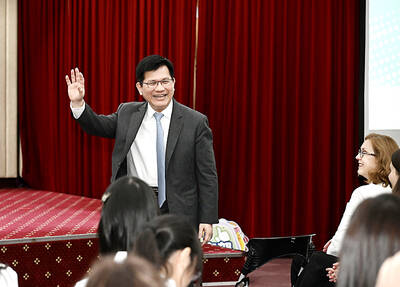Taiwan has donated US$700,000 to two APEC sub-funds to highlight the importance of health and technology amid the COVID-19 pandemic, the Ministry of Foreign Affairs said yesterday.
Taiwan has been a member of APEC since joining the 21-member organization under the name “Chinese Taipei” in 1991.
Malaysia, the host for all APEC meetings this year, has informed member states that the second senior officials’ meeting, scheduled for June 15 to 28, is to be postponed due to the pandemic, Department of International Organizations Director-General Bob Chen (陳龍錦) told a regular news briefing in Taipei.
However, a virtual extraordinary senior officials’ meeting for discussing the coronavirus is to be held today, at which local officials are to share the “Taiwan model” for containing the coronavirus, he added.
Chen in February led a delegation to the first senior officials’ meeting in Putrajaya, Malaysia.
Earlier this month, Taiwan donated US$500,000 to APEC’s Human Security Sub-Fund and US$200,000 to its Digital Innovation Sub-Fund, he said.
The purpose of the donations was to increase members’ awareness of the pandemic’s effects on human security, highlight the importance of health for economic growth and free trade in the Asia-Pacific region, and promote the use of digital technology in fighting pandemics, he said.
Representatives from Taiwan were invited to participate in five videoconferences organized by APEC’s Business Advisory Council, Chen said, adding that Acer Inc (宏碁) chairman Jason Chen (陳俊聖), Taiwan Mobile Co (台灣大哥大) president Jamie Lin (林之晨) and Quanta Computer Inc (廣達電腦) chief technology officer Ted Chang (張嘉淵) were appointed as presidential delegates to the meetings.
The first three meetings were held on May 14, May 15 and Tuesday last week, while the remaining two are to be held on Thursday and June 24, Bob Chen added.
In the videoconferences, Jason Chen explained how Acer has helped the Centers for Disease Control (CDC) install disease information systems and called on APEC to attach more importance to cybersecurity by setting up protocols to combat cyberattacks, Bob Chen said.
Chang drew attention to changes and business opportunities brought about by the pandemic, such as increased attention to digital infrastructure, transnational tracking systems and long-distance medical care systems, Bob Chen added.
The pandemic has also fostered a so-called “contactless economy,” which relies on 5G infrastructure, big data, artificial intelligence and other emerging technologies to renovate existing industrial chains, he said.
Lin shared how the nation’s five major telecoms, including Taiwan Mobile, have worked with the CDC to set up “digital fencing” to track returning citizens and foreign tourists required to undergo a 14-day home isolation, as well as a system to broadcast instant messages to maintain contact with them, he said.
Jason Chen and Lin asked Pell Biomed Technology (沛爾生技醫藥) founder Steve Lin (林成龍) and KKday CEO Ming Chen (陳明明) to serve as their deputies, participating in sessions they could not attend, Bob Chen added.

FIREPOWER: On top of the torpedoes, the military would procure Kestrel II anti-tank weapons systems to replace aging license-produced M72 LAW launchers Taiwan is to receive US-made Mark 48 torpedoes and training simulators over the next three years, following delays that hampered the navy’s operational readiness, the Ministry of National Defense’s latest budget proposal showed. The navy next year would acquire four training simulator systems for the torpedoes and take receipt of 14 torpedoes in 2027 and 10 torpedoes in 2028, the ministry said in its budget for the next fiscal year. The torpedoes would almost certainly be utilized in the navy’s two upgraded Chien Lung-class submarines and the indigenously developed Hai Kun, should the attack sub successfully reach operational status. US President Donald Trump

Taiwan Semiconductor Manufacturing Co (TSMC, 台積電) is expected to start construction of its 1.4-nanometer chip manufacturing facilities at the Central Taiwan Science Park (CTSP, 中部科學園區) as early as October, the Chinese-language Liberty Times (the Taipei Times’ sister newspaper) reported yesterday, citing the park administration. TSMC acquired land for the second phase of the park’s expansion in Taichung in June. Large cement, construction and facility engineering companies in central Taiwan have reportedly been receiving bids for TSMC-related projects, the report said. Supply-chain firms estimated that the business opportunities for engineering, equipment and materials supply, and back-end packaging and testing could reach as high as

ALL QUIET: The Philippine foreign secretary told senators she would not respond to questions about whether Lin Chia-lung was in the country The Ministry of Foreign Affairs on Wednesday confirmed that a business delegation is visiting the Philippines, but declined to say whether Minister of Foreign Affairs Lin Chia-lung (林佳龍) is part of the group, as Philippine lawmakers raised questions over Lin’s reported visit. The group is being led by Deputy Minister of Agriculture Huang Chao-chin (黃昭欽), Chinese International Economic Cooperation Association (CIECA) chairman Joseph Lyu (呂桔誠) and US-Taiwan Business Council (USTBC) vice president Lotta Danielsson, the ministry said in a statement. However, sources speaking on condition of anonymity said that Lin is leading the delegation of 70 people. Filinvest New Clark City Innovation Park

TPP RALLY: The clashes occurred near the Chiang Kai-shek Memorial Hall on Saturday at a rally to mark the anniversary of a raid on former TPP chairman Ko Wen-je People who clashed with police at a Taiwan People’s Party (TPP) rally in Taipei on Saturday would be referred to prosecutors for investigation, said the Ministry of the Interior, which oversees the National Police Agency. Taipei police had collected evidence of obstruction of public officials and coercion by “disorderly” demonstrators, as well as contraventions of the Assembly and Parade Act (集會遊行法), the ministry said in a statement on Sunday. It added that amid the “severe pushing and jostling” by some demonstrators, eight police officers were injured, including one who was sent to hospital after losing consciousness, allegedly due to heat stroke. The Taipei